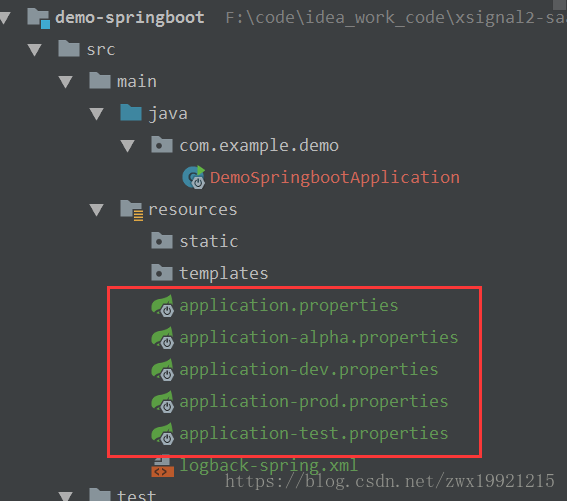жӮЁеҘҪпјҢзҷ»еҪ•еҗҺжүҚиғҪдёӢи®ўеҚ•е“ҰпјҒ
иҝҷзҜҮж–Үз« дё»иҰҒд»Ӣз»ҚдәҶspringbootдёӯеӨҡзҺҜеўғй…ҚзҪ®зҡ„зӨәдҫӢеҲҶжһҗпјҢе…·жңүдёҖе®ҡеҖҹйүҙд»·еҖјпјҢж„ҹе…ҙи¶Јзҡ„жңӢеҸӢеҸҜд»ҘеҸӮиҖғдёӢпјҢеёҢжңӣеӨ§е®¶йҳ…иҜ»е®ҢиҝҷзҜҮж–Үз« д№ӢеҗҺеӨ§жңү收иҺ·пјҢдёӢйқўи®©е°Ҹзј–еёҰзқҖеӨ§е®¶дёҖиө·дәҶи§ЈдёҖдёӢгҖӮ
NO1.жҲ‘们еңЁеҒҡйЎ№зӣ®зҡ„ж—¶еҖҷжҳҜдёҚжҳҜйғҪдјҡеҢәеҲҶеҫҲеӨҡзҺҜеўғе‘ўпјҹжҜ”еҰӮејҖеҸ‘зҺҜеўғгҖҒжөӢиҜ•зҺҜеўғгҖҒз”ҹдә§зҺҜеўғзӯүпјҢйӮЈд№Ҳ第дёҖжӯҘжҲ‘е°Ҷе…ҲеёҰеӨ§е®¶й…ҚзҪ®еҘҪеҗ„дёӘзҺҜеўғпјӣ
1.йҰ–е…Ҳжү“ејҖжҲ‘们项зӣ®зҡ„pom.xmlж–Ү件еҠ е…Ҙд»ҘдёӢеҶ…е®№пјҡ
<build>
<finalName>${project.artifactId}-${project.version}</finalName>
<plugins>
<plugin>
<groupId>org.springframework.boot</groupId>
<artifactId>spring-boot-maven-plugin</artifactId>
<executions>
<execution>
<goals>
<goal>repackage</goal>
</goals>
</execution>
</executions>
</plugin>
<plugin>
<groupId>org.apache.maven.plugins</groupId>
<artifactId>maven-compiler-plugin</artifactId>
<version>3.3</version>
<configuration>
<source>1.8</source>
<target>1.8</target>
<encoding>utf8</encoding>
</configuration>
</plugin>
</plugins>
<filters>
<filter>src/main/resources/application-${filter-resource-name}.properties</filter>
</filters>
<resources>
<resource>
<directory>src/main/resources</directory>
<filtering>true</filtering>
<excludes>
<exclude>filters/*</exclude>
<exclude>filters/*</exclude>
<exclude>application-dev.properties</exclude>
<exclude>application-test.properties</exclude>
<exclude>application-alpha.properties</exclude>
<exclude>application-prod.properties</exclude>
</excludes>
</resource>
<resource>
<directory>src/main/resources</directory>
<filtering>true</filtering>
<includes>
<include>application-${filter-resource-name}.properties</include>
</includes>
</resource>
</resources>
</build>
<profiles>
<profile>
<id>dev</id>
<activation>
<activeByDefault>true</activeByDefault>
</activation>
<properties>
<filter-resource-name>dev</filter-resource-name>
</properties>
</profile>
<profile>
<id>test</id>
<properties>
<filter-resource-name>test</filter-resource-name>
</properties>
</profile>
<profile>
<id>alpha</id>
<properties>
<filter-resource-name>alpha</filter-resource-name>
</properties>
</profile>
<profile>
<id>prod</id>
<properties>
<filter-resource-name>prod</filter-resource-name>
</properties>
</profile>
</profiles>иҝҷдёҖж®өзӣёдҝЎеӨ§е®¶йғҪеҫҲзҶҹжӮүдәҶеҗ§пјҢжҲ‘е°ұдёҚеӨҡеҒҡи§ЈйҮҠдәҶпјҲжңүз–‘й—®зҡ„з«ҘйһӢеҸҜд»Ҙз§ҒдҝЎжҲ‘е“Ұпјүпјӣ
2.然еҗҺжү“ејҖapplication.propertiesж–Ү件пјҢ并еңЁе…¶дёӯеҠ е…Ҙд»ҘдёӢеҶ…е®№пјҡ
#иЎЁзӨәжҝҖжҙ»зҡ„й…ҚзҪ®ж–Ү件пјҲdev|prodпјү
spring.profiles.active=@filter-resource-name@
ж•ҙдёӘйЎ№зӣ®еҸҳжҲҗдәҶеҰӮдёӢз»“жһ„пјҡ

иҮіжӯӨжҲ‘们зҡ„springbootеӨҡзҺҜеўғй…ҚзҪ®е·Із»Ҹе®ҢжҲҗпјӣ
3.и®ҫзҪ®ж—Ҙеҝ—зә§еҲ«
#log level logging.level.root=debug
4.и®ҫзҪ®иҮӘе®ҡд№үз«ҜеҸЈд»ҘеҸҠе®һдҫӢеҗҚ
#з«ҜеҸЈ server.port=8888 #е®һдҫӢеҗҚ spring.application.name=demo-springboot
5.logback-spring.xml
<?xml version="1.0" encoding="UTF-8"?>
<configuration>
<include resource="org/springframework/boot/logging/logback/base.xml" />
<appender name="demo" class="ch.qos.logback.core.rolling.RollingFileAppender">
<file>demo/demo.log</file>
<rollingPolicy class="ch.qos.logback.core.rolling.TimeBasedRollingPolicy">
<!-- жҢүеӨ©еӣһж»ҡ daily -->
<fileNamePattern>demo/demo.%d{yyyy-MM-dd}.log</fileNamePattern>
<!-- ж—Ҙеҝ—жңҖеӨ§зҡ„еҺҶеҸІ 10еӨ© -->
<maxHistory>10</maxHistory>
</rollingPolicy>
<encoder charset="UTF-8">
<pattern>${FILE_LOG_PATTERN}</pattern>
</encoder>
</appender>
<logger name="com.example.demo" level="INFO" additivity="false">
<appender-ref ref="demo"/>
</logger>
<logger name="com.example.demo.dao" level="DEBUG" />
<logger name="com.example.demo.service" level="INFO" />
<logger name="druid.sql.Statement" level="DEBUG" />
<logger name="druid.sql.ResultSet" level="DEBUG" />
<logger name="org.apache" level="INFO" />
<logger name="org.mybatis.spring" level="ERROR" />
<logger name="org.springframework" level="INFO"></logger>
<logger name="springfox" level="ERROR"></logger>
<root level="INFO">
<appender-ref ref="demo" />
</root>
</configurationж„ҹи°ўдҪ иғҪеӨҹи®Өзңҹйҳ…иҜ»е®ҢиҝҷзҜҮж–Үз« пјҢеёҢжңӣе°Ҹзј–еҲҶдә«зҡ„вҖңspringbootдёӯеӨҡзҺҜеўғй…ҚзҪ®зҡ„зӨәдҫӢеҲҶжһҗвҖқиҝҷзҜҮж–Үз« еҜ№еӨ§е®¶жңүеё®еҠ©пјҢеҗҢж—¶д№ҹеёҢжңӣеӨ§е®¶еӨҡеӨҡж”ҜжҢҒдәҝйҖҹдә‘пјҢе…іжіЁдәҝйҖҹдә‘иЎҢдёҡиө„и®Ҝйў‘йҒ“пјҢжӣҙеӨҡзӣёе…ізҹҘиҜҶзӯүзқҖдҪ жқҘеӯҰд№ !
е…ҚиҙЈеЈ°жҳҺпјҡжң¬з«ҷеҸ‘еёғзҡ„еҶ…е®№пјҲеӣҫзүҮгҖҒи§Ҷйў‘е’Ңж–Үеӯ—пјүд»ҘеҺҹеҲӣгҖҒиҪ¬иҪҪе’ҢеҲҶдә«дёәдё»пјҢж–Үз« и§ӮзӮ№дёҚд»ЈиЎЁжң¬зҪ‘з«ҷз«ӢеңәпјҢеҰӮжһңж¶үеҸҠдҫөжқғиҜ·иҒ”зі»з«ҷй•ҝйӮ®з®ұпјҡis@yisu.comиҝӣиЎҢдёҫжҠҘпјҢ并жҸҗдҫӣзӣёе…іиҜҒжҚ®пјҢдёҖз»ҸжҹҘе®һпјҢе°Ҷз«ӢеҲ»еҲ йҷӨж¶үе«ҢдҫөжқғеҶ…е®№гҖӮ
жӮЁеҘҪпјҢзҷ»еҪ•еҗҺжүҚиғҪдёӢи®ўеҚ•е“ҰпјҒ